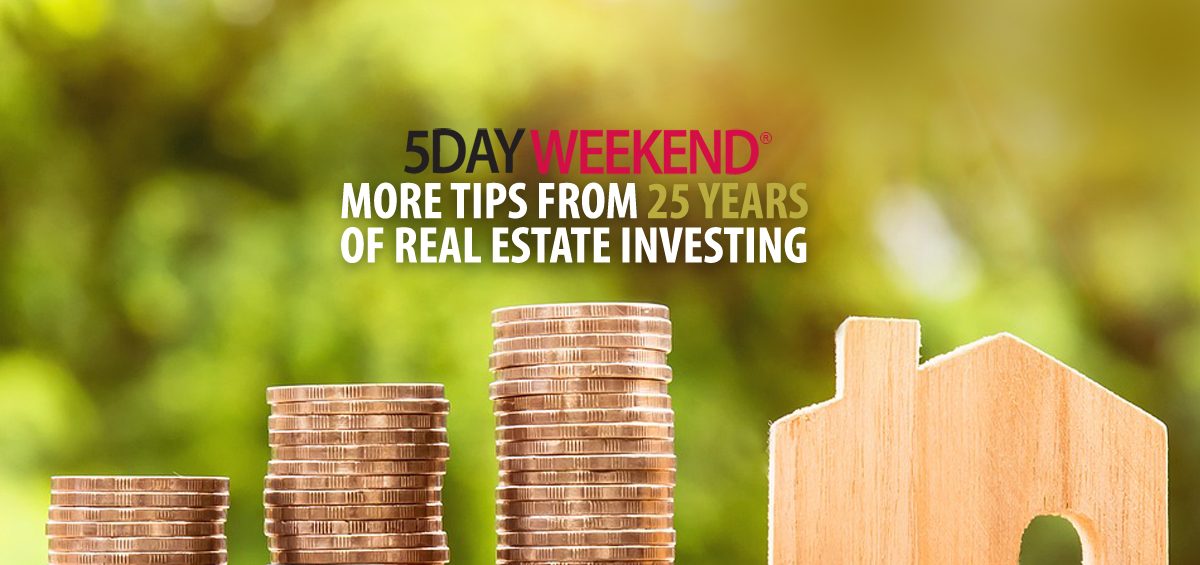In my previous posts, I shared some of my insights that I’ve learned from my more than two decades of experience investing in real estate. Here are more of what you need to know to get started in real estate investing:
- Find Properties in Which You Can Build Sweat Equity
Look for properties in which you can build in some “sweat equity” with some basic improvements. I don’t purchase new properties. Why pay a hefty profit to a developer? There is zero value to be added.
- Be Smart About Renovations
When I was starting out, it was all about sweat equity. I assembled a small crew of skilled laborers to help me renovate my first purchases. I often worked side by side with them. Over a period of time, we developed a cookie-cutter system where every property inside looked exactly the same. We would often use the same style paint, carpet, tiling, stone, wood floors, and cedar blinds in all properties.
The rules were clear. With every project we would renovate the kitchen and bathrooms, which is where you can increase the value the most. First impressions count when walking up to the premises, so the front door is always painted or replaced. New garden lawn and plants are added with a new mailbox at the curbside. These are enhancements that increase the value.

With all renovations, I keep my budget expenses to no more than 15% of the purchase price. I allocate the correct percentage of my budget to the different elements within the property. Depending on the property, I may consider allocating 30% of the budgeted funds to the kitchen, 20% to the bathroom, 20% to the exterior and 30% for general improvements.
If a property can’t meet my budget criteria, I don’t purchase it. The rule is to renovate for profit. View the valuation of comparable renovated properties in the area for further validation.
- Add Value to Rent Out Properties Faster
All my rentals come with appliances, including a fridge, oven, dishwasher, and microwave. I include Wi-fi and cable TV for free, but add the cost of those into the rent. Adding such amenities allows me to rent out my properties faster.
- Manage Your Property Wisely
A very common way would-be investors lose their shirts and get disenchanted with real estate is by not managing their investments properly. First-time amateurs who haven’t done their research have no mechanism for collecting rent. They don’t properly screen tenants and thus have to deal with bad ones. When tenants don’t pay rent on time, they’re too lenient because they don’t want to be “mean.”
They also do a poor job of managing the finances. They don’t take into account additional costs, such as taxes and vacancy. They don’t have a large enough emergency fund to handle repairs and maintenance. They get so excited about the idea of passive income that they neglect the management of their properties. As a result, they have a bad experience and end up saying things like, “Real estate is a bad investment.”
It’s possible to properly manage your own properties if you know what you’re doing and you want to spend the time. For most people, I recommend using a property manager; the added fees are well worth the reduced hassle.
- Have an Emergency Fund
Make sure you have enough liquidity (cash on hand) to handle maintenance and repairs, bad tenants, or vacancies. As a rule of thumb, you should have at least six months of mortgage payments in a separate bank account.
Also, keep in mind that your Rockefeller Formula Cash Flow Insurance policy is an excellent resource for this.
- Hold On To Your Cash
Cash is precious because it’s used to buy assets that convert your cash into cash flow. The more cash you sink into one property, the less you have for other deals.
You can make this mistake in a few ways. First, you can buy too big of a property. The bigger the property, the bigger your down payment. Also, with single-family investments, the bigger the home, the greater the risk. Lots of people lost tons of money during the past recession by trying to make money from big, expensive houses. When the market tanked, they were sitting on huge payments and they owed more to the bank than what the properties were worth. If all of your cash is wrapped up in one property that you can’t cash flow or sell, you’re in trouble.
You can also make this mistake by putting too much money down, and by doing too short of a loan term, which makes for a high payment. Always put the least amount down as possible and make your loan term for as long as possible to have the lowest possible payment. You want to stay as liquid as possible; money tied up in property equity may not be accessible. And the lower your payment, the higher your cash flow.
- Don’t Over-Leverage
One strategy that wiped out many property speculators in the last financial crisis was borrowing 100% on properties. Banks were handing out loans like candy—and not just any loans, but crazy loans like stated income, no documents required, no down payment required. As a result, inexperienced investors got over-leveraged, and when the market crashed they were upside down and in over their heads.
Buying when the market is high and borrowing 100% leaves you with no viable exit strategy should you need to get out of a property—short of foreclosing, giving the property back to the bank, and killing your credit.
When you buy a property at least 15% below market value and put 20% down, you have a built-in buffer should the market crash. Furthermore, your rental cash flow should always exceed your mortgage payment regardless of what the market does. You build your exit strategy into your purchase, versus trying to figure it out when something bad happens that’s out of your control.
Don’t be afraid of debt, but also respect it. It can be an amazing tool when leveraged wisely, but it can kill you when you overuse it.
- Understand Market Volatility and Exit Strategies
You need to understand how market shifts will impact your property. If the market tanks, will you still be able to cover the mortgage in rent? If you can’t sell the property, can you still generate a positive cash flow?
You also need to know what strategies work best in which markets. For example, recessions are often perfect for rentals be- cause a lot of people get credit dings and can’t get financing, but they can still afford to pay rent.
Finally, what is your exit strategy? Do you plan on holding onto this property forever? Will you sell and purchase a better property, using a 1031 Exchange, if the property appreciates to a certain level? If you had to, would you be able to sell it quickly at a profit, or will you have to wait out the market? One of the worst-case scenarios in real estate investing is having a property that you can’t sell and that is draining money month after month.
You can do this!
Real estate has been good to me over the past two+ decades. In fact, it’s been one of my primary strategies for creating my 5 Day Weekend. I know it can do the same for you.

Real estate isn’t always easy. It can be hard and complicated. You can definitely make mistakes and lose money. But it’s also worth it! Few things give you greater leverage and more investment advantages than real estate. You just have to stick with it. Research as much as you can. Take action. Learn from your mistakes. Keep moving forward.
In the end, when you’re living your 5 Day Weekend, you’ll be glad you did.
In my next post, I explore how you can “go big” using alternative momentum investments.
In the meantime, I’d love to hear about any experiences you’ve had from real estate investment, if any. Your own insights are always valuable. Thank you for sharing.
Secure your copy of the “5 Day Weekend” book. 5 Day Weekend: Freedom to Make Your Life and Work Rich with Purpose [Nik Halik & Garrett Gunderson]
















Leave a Comment